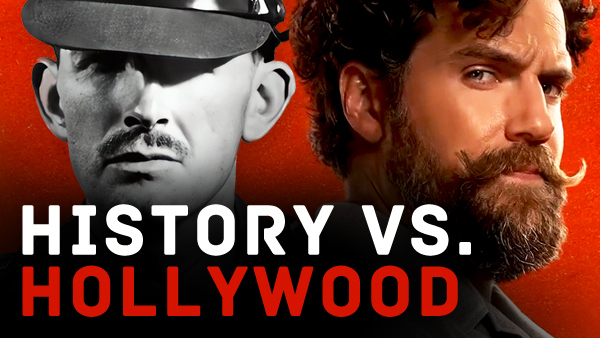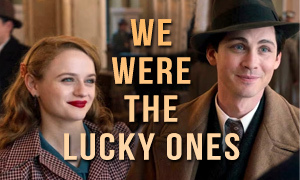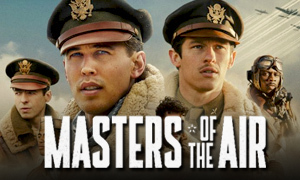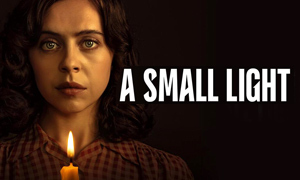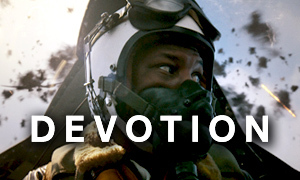A Journal for Jordan: History vs. Hollywood
Michael B. Jordan
Born: February 9, 1987
Birthplace:
Santa Ana, California, USA
Charles Monroe King
Born: June 10, 1958
Birthplace: Cleveland, Ohio, USA
Death: October 14, 2006, Baghdad, Iraq (Roadside IED attack)
Chanté Adams
Born: December 16, 1994
Birthplace:
Detroit, Michigan, USA
Dana Canedy
Born: June 8, 1965
Birthplace: Indianapolis, Indiana, USA
Baby Actor
Jordan King
Born: March 28, 2006
Birthplace: New York City, New York, USA
How did Charles Monroe King meet his fiancée Dana Canedy?
The A Journal for Jordan true story reveals that Charles first met Dana at her family's old home in Radcliff, which is not far from Fort Knox, Kentucky. He stopped by to deliver a piece of artwork he created for her father. In her memoir, Dana describes thinking that he was "gorgeous" when they first laid eyes on each other.
For years, Dana says that she resisted getting deeply involved with Charles, mainly because as the daughter of an Army veteran, she knew what it was like to grow up on military bases and she "wanted no more of that life." Their career aspirations also kept them geographically apart for a number of years. They both dated other people at times during their nearly decade-long relationship, but ultimately, she says that "it was his steadiness, his character, and his sureness about who he was and what he stood for that won me over." As seen in the movie, there was an opposites attract element to their relationship. Charles displayed courteous Midwestern values, while The New York Times senior editor Dana was more modern and drawn to city life.
Did they find out the sex of their unborn baby before Charles left for Iraq?
Yes. Charles and Dana decided to have a child upon learning that Charles was going to be deployed to Iraq. Dana says that it helped to put things into perspective regarding what was important in life. They wanted to find out if they were having a boy or a girl before Charles left so that he could formulate an image of his child in his mind. Charles kept Jordan's sonogram pictures "in a pocket in his uniform the whole time he was in Iraq."
When were Charles Monroe King and Dana Canedy supposed to get married?
While researching A Journal for Jordan fact vs. fiction, we discovered that the couple had set a wedding date for June 9, 2007, the day between their birthdays.
Did Dana give Charles a journal hoping he would write a few words for his son in case he didn't make it back from Iraq?
Yes. Weeks before departing for the Iraq War in December 2005, Dana Canedy gave her fiancé Charles Monroe King a journal for fathers that had questions on each page. In her memoir, Dana writes, "Even before he boarded that plane headed for danger, I worried that he would be killed. So I gave him a journal. I hoped he would write a few messages, perhaps some words of encouragement to you, though you were not yet born, in case he died before you knew each other."
Charles began to fervently write in what would become a more-than 200-page journal, hoping to finish the majority of the journal before he departed. He wanted to offer his son advice and prayers that he could reflect on during his life. The actual journal that Charles wrote in, titled A Father's Legacy, is shown in the movie and copies can still be found in limited availability.
What did Charles Monroe King include in the journal for his son, Jordan?
While conducting our A Journal for Jordan fact-check, we learned that Charles instructed his son on everything from dealing with disappointment and resolving conflict to how to treat a lady and act on a date. He included his favorite Bible verses and emphasized the power of prayer. He stressed the importance of duty, honor, and putting others before oneself.
He even told his son about his own experiences in combat, including recovering the remains of a young soldier's body from a tank, and the importance of honoring the lives of those who make the ultimate sacrifice. It was not long after the young soldier's death that Charles mailed the journal home in July 2006. It was unfinished, but Charles wanted to make sure what he had written made it home. Plenty of his journal entries are included in his fiancée Dana Canedy's memoir, including the following:
Be humble about your accomplishments, work harder than the man next to you, it is all right for boys to cry. Sometimes crying can release a lot of pain and stress. Never be ashamed to cry. It has nothing to do with your manhood.
Was religion a big part of Charles Monroe King's life?
Yes. In exploring the A Journal for Jordan true story, we discovered that King's devotion to God is evident throughout his journal entries to his son. In one entry, he expressed his thankfulness to God for leading him to the Army:
Enlisting in the Army was one of the best decisions I had ever made in my life. God blessed me above all I could imagine. Like anything, you have some challenging days, but when I look back I have no regrets. The army even recognized my artistic abilities. I also met a lot of great people. It's been an awesome experience. Thanks, God.
Did the real Charles Monroe King miss the birth of his son?
Yes. First Sergeant Charles Monroe King insisted that he would only take his leave after all of the 105 men he commanded had gone home first, many of whom were very young and just out of high school. His fiancée, Dana Canedy, later wrote, "I struggled to understand what motivated the man who had for so long dreamed of your birth but chose to miss it because he believed his soldiers needed him more." King had a "strong sense of duty." He was already a father figure to many of the young men and women who served under him. He taught them how to balance a checkbook, bailed them out of jail, and even discussed birth control with them.
Are Charles Monroe King's actual journal entries used in the movie?
Yes. While answering the question, "How true is A Journal for Jordan?" we discovered that many of Charles Monroe King's actual journal entries are used in the movie. "We use a lot of [Charles's] journal entries in the script," actor Michael B. Jordan told Entertainment Weekly, "so you'll actually get quotes and actual thoughts from Charles in the movie as well. So we just tried to stay in that wheelhouse of truth and just be as honest as we could throughout every step."
Did Charles Monroe King get to meet his infant son prior to being killed in action?
Yes. Like in the Denzel Washington movie, almost eight months after being deployed to Iraq, Charles Monroe King took his mid-deployment leave and went home to meet his infant son. During his two-week leave, he continued working on the over 200-page journal for his son, which he would ultimately never finish. He was killed in action approximately two months later.
Is Charles Monroe King's age depicted accurately in the movie?
No. The real Charles Monroe King was significantly older than actor Michael B. Jordan is in the movie. Born in 1958, King was 48 when he died in 2006. Actor Michael B. Jordan was just 33 when production on the movie began, making him approximately 15 years younger than King was when he experienced the real-life events. In fact, the real First Sergeant Charles Monroe King had prior wartime experience. He had fought in the First Gulf War in 1991, and his arms had permanent splotches from chemical sprays he received during that conflict. He suffered from a certain amount of PTSD from his wartime experiences and did not speak about them.
King's fiancée, Dana Canedy, was approximately six years younger than him and was around the age of 41 during the events depicted in the film. Actress Chanté Adams, who portrays Canedy in the movie, was only 26 at the time of filming, and like Michael B. Jordan, roughly 15 years younger than her real-life counterpart.
As for Charles Monroe King's physical resemblance to actor Michael B. Jordan, fitness was important to him, and according to Dana, he "spent hours sculpting a taut body, even starting his days in Iraq in a gym at 5 a.m."
Had the real-life Charles Monroe King ever been married before?
Yes. While investigating the A Journal for Jordan true story, we learned that the real Charles Monroe King, who was much older in real life than actor Michael B. Jordan in the movie, had previously been married and divorced. He married his first wife shortly after joining the Army in 1987. They had a daughter named Christina. Dana Canedy writes in her memoir that "he had tried to be a good father to Christina ... and it had always pained him that he didn't spend more time with her."
Did Charles Monroe King have a love for art and drawing?
Yes. Dana Canedy talks about King's love for art in her memoir, stating that he drew everything from angels bowed in prayer to pictures of her. Prior to joining the Army in 1987, King had attended the Art Institute of Chicago and had worked as an illustrator in Alabama for several years.
How did First Sergeant Charles Monroe King die?
On October 14, 2006, Charles was killed by an improvised explosive device (IED) that exploded beneath his Humvee while on a convoy outside of Baghdad, Iraq. Staff Sgt. Joseph M. Kane and Cpl. Timothy J. Lauer were killed in the explosion as well. Charles had volunteered for the mission that took his life. First Sergeant Charles Monroe King's death occurred when his infant son, Jordan, was just six months old.
A friend and fellow soldier named Renita Wickes, who had spent years working closely with Charles, described him by saying, "Charles was absolutely one of my best friends in the world. ... Charles was a 'Soldier's Soldier.' He loved the uniform and the military. You could see him in each of the Army's values -- that was just the type of person he was." -U.S. Army
Did Charles Monroe King reveal anything in his journal for his son that his fiancée Dana herself didn't know?
Yes. While exploring how true is A Journal for Jordan, we discovered that in her memoir, the real Dana Canedy says that Charles revealed things in the journal for their son that she herself never knew. He told their son he wanted to take guitar lessons and see the Great Wall of China. He also went into detail about his religious faith, his love of art, and growing up in Cleveland, including the bell-bottoms and stack-heeled shoes he wore in junior high school. Dana said that she was unaware of other things about Charles as well, including the details of his first kiss, the fact that he had sung in the youth choir at his Methodist church, and that he was a lifelong Cleveland Browns fan.
Is A Journal for Jordan based on a book?
Yes. The Denzel Washington movie is based on the 2008 New York Times Bestseller A Journal for Jordan: A Story of Love and Honor written by Charles Monroe King's fiancée, Dana Canedy. The book grew out of a piece she had written for The New York Times about First Sergeant Charles Monroe King's death in the war in Iraq and the journal he had written for their son, Jordan. Many of the entries from King's journal are woven throughout the book. As King did with the journal, Canedy says that she wrote the book for her son. "I needed to do something with my grief after Charles died, something productive," said Canedy, "because I realized I could either sink into the grief and be angry and bitter, or I could do something productive, and writing has always been a salvation for me." -Crown Publishing
At the time that the events in the movie unfold, Canedy was already a Pulitzer Prize-winning journalist. She had received the award in 2001 as part of a team of writers for The New York Times who created the series "How Race Is Lived in America." Not long before her fiancé Charles Monroe King's death in 2006, she had become a senior editor at the Times. In 2017, she was appointed Administrator of Pulitzer Prizes at Columbia University, where the prizes in journalism, music, drama, and letters are administered. Today, Dana Canedy works as the senior vice president and publisher of Simon & Schuster, a position that she's held since July 2020. She is the first black American to hold the position.
Did Michael B. Jordan meet the real Dana Canedy to help prepare for the role?
Yes. Michael B. Jordan says that he talked to Canedy and was able to spend time with her. While analyzing the A Journal for Jordan fact vs. fiction, we learned that the actor also trained at Fort Irwin and "went through a little bit of bootcamp" and experienced what it was like to actually lead a platoon as King did. He talked to Dana Canedy and Charles Monroe King's son Jordan as well, who is now a teenager. "I think being able to have people that were so close to him as a resource was so extremely important," the actor told Entertainment Weekly.
What is Jordan King doing today?
In exploring the true story behind the Denzel Washington movie, we learned that Charles Monroe King and Dana Canedy's son Jordan is currently 15 years old and living in New York City with his mother.
Does Dana Canedy view the widespread praise of her book as a sign of racial progress in America?
Yes. "I'll tell you something that's been amazing to me," said Dana. "I've traveled literally from coast to coast across this country to speak about the book in bookstores and on TV and in radio, and people who have shown up to hear me speak and to hear me read from the book have been from all walks of life, all creeds, all colors. It's been unbelievable, people sobbing in the audience or saying that they're praying for Jordan and me."
"I really think it says so much about how far we've come, that people have embraced this book and our story, and it's an afterthought that Charles was black. It rarely comes up, and that says a lot about progress. I'm proud of that, but I'm also proud that we are a black family." -Cuny TV Interview

